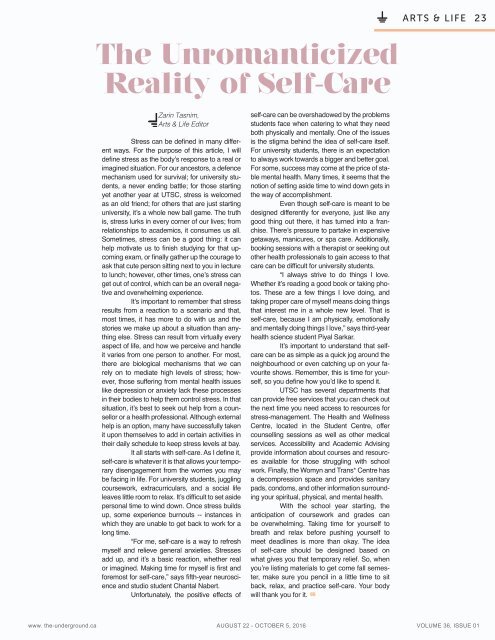You also want an ePaper? Increase the reach of your titles
YUMPU automatically turns print PDFs into web optimized ePapers that Google loves.
ARTS & LIFE 23<br />
The Unromanticized<br />
Reality of Self-Care<br />
Zarin Tasnim,<br />
Arts & Life Editor<br />
Stress can be defined in many different<br />
ways. For the purpose of this article, I will<br />
define stress as the body’s response to a real or<br />
imagined situation. For our ancestors, a defence<br />
mechanism used for survival; for university students,<br />
a never ending battle; for those starting<br />
yet another year at UTSC, stress is welcomed<br />
as an old friend; for others that are just starting<br />
university, it’s a whole new ball game. The truth<br />
is, stress lurks in every corner of our lives; from<br />
relationships to academics, it consumes us all.<br />
Sometimes, stress can be a good thing: it can<br />
help motivate us to finish studying for that upcoming<br />
exam, or finally gather up the courage to<br />
ask that cute person sitting next to you in lecture<br />
to lunch; however, other times, one’s stress can<br />
get out of control, which can be an overall negative<br />
and overwhelming experience.<br />
It’s important to remember that stress<br />
results from a reaction to a scenario and that,<br />
most times, it has more to do with us and the<br />
stories we make up about a situation than anything<br />
else. Stress can result from virtually every<br />
aspect of life, and how we perceive and handle<br />
it varies from one person to another. For most,<br />
there are biological mechanisms that we can<br />
rely on to mediate high levels of stress; however,<br />
those suffering from mental health issues<br />
like depression or anxiety lack these processes<br />
in their bodies to help them control stress. In that<br />
situation, it’s best to seek out help from a counsellor<br />
or a health professional. Although external<br />
help is an option, many have successfully taken<br />
it upon themselves to add in certain activities in<br />
their daily schedule to keep stress levels at bay.<br />
It all starts with self-care. As I define it,<br />
self-care is whatever it is that allows your temporary<br />
disengagement from the worries you may<br />
be facing in life. For university students, juggling<br />
coursework, extracurriculars, and a social life<br />
leaves little room to relax. It’s difficult to set aside<br />
personal time to wind down. Once stress builds<br />
up, some experience burnouts -- instances in<br />
which they are unable to get back to work for a<br />
long time.<br />
“For me, self-care is a way to refresh<br />
myself and relieve general anxieties. Stresses<br />
add up, and it’s a basic reaction, whether real<br />
or imagined. Making time for myself is first and<br />
foremost for self-care,” says fifth-year neuroscience<br />
and studio student Chantal Nabert.<br />
Unfortunately, the positive effects of<br />
self-care can be overshadowed by the problems<br />
students face when catering to what they need<br />
both physically and mentally. One of the issues<br />
is the stigma behind the idea of self-care itself.<br />
For university students, there is an expectation<br />
to always work towards a bigger and better goal.<br />
For some, success may come at the price of stable<br />
mental health. Many times, it seems that the<br />
notion of setting aside time to wind down gets in<br />
the way of accomplishment.<br />
Even though self-care is meant to be<br />
designed differently for everyone, just like any<br />
good thing out there, it has turned into a franchise.<br />
There’s pressure to partake in expensive<br />
getaways, manicures, or spa care. Additionally,<br />
booking sessions with a therapist or seeking out<br />
other health professionals to gain access to that<br />
care can be difficult for university students.<br />
“I always strive to do things I love.<br />
Whether it’s reading a good book or taking photos.<br />
These are a few things I love doing, and<br />
taking proper care of myself means doing things<br />
that interest me in a whole new level. That is<br />
self-care, because I am physically, emotionally<br />
and mentally doing things I love,” says third-year<br />
health science student Piyal Sarkar.<br />
It’s important to understand that selfcare<br />
can be as simple as a quick jog around the<br />
neighbourhood or even catching up on your favourite<br />
shows. Remember, this is time for yourself,<br />
so you define how you’d like to spend it.<br />
UTSC has several departments that<br />
can provide free services that you can check out<br />
the next time you need access to resources for<br />
stress-management. The Health and Wellness<br />
Centre, located in the Student Centre, offer<br />
counselling sessions as well as other medical<br />
services. Accessibility and Academic Advising<br />
provide information about courses and resources<br />
available for those struggling with school<br />
work. Finally, the Womyn and Trans* Centre has<br />
a decompression space and provides sanitary<br />
pads, condoms, and other information surrounding<br />
your spiritual, physical, and mental health.<br />
With the school year starting, the<br />
anticipation of coursework and grades can<br />
be overwhelming. Taking time for yourself to<br />
breath and relax before pushing yourself to<br />
meet deadlines is more than okay. The idea<br />
of self-care should be designed based on<br />
what gives you that temporary relief. So, when<br />
you’re listing materials to get come fall semester,<br />
make sure you pencil in a little time to sit<br />
back, relax, and practice self-care. Your body<br />
will thank you for it.<br />
www. the-underground.ca AUGUST 22 - OCTOBER 5, 2016<br />
VOLUME 36, ISSUE 01












![[WEB]_ISSUE 06[EDIT3]_RachelChin](https://img.yumpu.com/58105406/1/190x245/web-issue-06edit3-rachelchin.jpg?quality=85)

